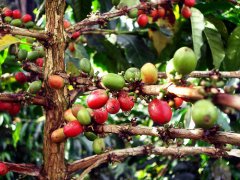Introduction to the place of origin of the historical name of mocha coffee beans
The characteristics of mocha coffee
Ethiopia, known as the birthplace of coffee, has a history of coffee origin and a traditional agricultural country, and is most famous for its "mocha-Mocha" coffee. In the West, Mocha is not only the name of the coffee variety, but also refers to the method of brewing coffee or the utensils for brewing coffee and special conditioning methods. Mocha coffee beans are mostly dried, but there are also so-called gourmet water-washed beans. Mocha beans are famous for their sour taste, slightly sweet, slightly alcoholic aroma and low caffeine content.
1. Taste: slightly sweet with soft acidity, sweetness has its unique round ripe taste and its unique sweet, sour and bitter taste is extremely elegant.
2. Fragrance: full-bodied aromas of fruit and grass.
3. Vision: the bean granule is small and the bean color is uneven.

Despite the high quality and smooth aroma of Yemeni coffee, there is something unsatisfactory, that is, the quality can not be continuously guaranteed, and the classification of its coffee beans is uncertain. Traditionally, the best coffee beans in Yemen come from Mattari, followed by Sharki, followed by Sanani. These beans are low in caffeine and are eaten from December to April of the following year. The problem in the past has been that coffee from the north was mixed with shoddy stuff before it was shipped from the southern port of Aden. Only coffee shipped from the port of Hodeida can be determined to be genuine from the north. The vast majority of Yemeni coffee is grown in natural conditions, mainly due to the lack of funds for growers.
Important Notice :
前街咖啡 FrontStreet Coffee has moved to new addredd:
FrontStreet Coffee Address: 315,Donghua East Road,GuangZhou
Tel:020 38364473
- Prev

Kenyan coffee treatment method
Coffee trees in Kenya are mostly planted at 1400 m-2000 m above sea level, and the growth areas include Ruiri, Thika, Kirinyaga and Mt. Kenya West, Nyeri, Kiambu and Muranga. Mainly in the foothills of Mt.Kenya and Aberdare. There are many producing areas in Kenya that strive to preserve the native forest ecosystem, protect the natural gene pool, and support the breeding of wild coffee varieties.
- Next

How to grow coffee berries and beans
Coffee fruit is a berry, also known as comb fruit. Oval, 9-14 mm long, young fruit green, red at maturity, purplish red. Each fruit generally has two seeds, but also one or three, showing a semi-oval, there is a longitudinal groove, called grooves. This is the past life of coffee beans, there are coffee branches, leaves, fruits, as well as dissected pulp, seeds, roasted coffee beans. What we see every day
Related
- Does Rose Summer choose Blue, Green or Red? Detailed explanation of Rose Summer Coffee plots and Classification in Panamanian Jade Manor
- What is the difference between the origin, producing area, processing plant, cooperative and manor of coffee beans?
- How fine does the espresso powder fit? how to grind the espresso?
- Sca coffee roasting degree color card coffee roasting degree 8 roasting color values what do you mean?
- The practice of lattes: how to make lattes at home
- Introduction to Indonesian Fine Coffee beans-- Java Coffee producing area of Indonesian Arabica Coffee
- How much will the flavor of light and medium roasted rose summer be expressed? What baking level is rose summer suitable for?
- Introduction to the characteristics of washing, sun-drying or wet-planing coffee commonly used in Mantenin, Indonesia
- Price characteristics of Arabica Coffee Bean Starbucks introduction to Manning Coffee Bean Taste producing area Variety Manor
- What is the authentic Yega flavor? What are the flavor characteristics of the really excellent Yejasuffi coffee beans?

